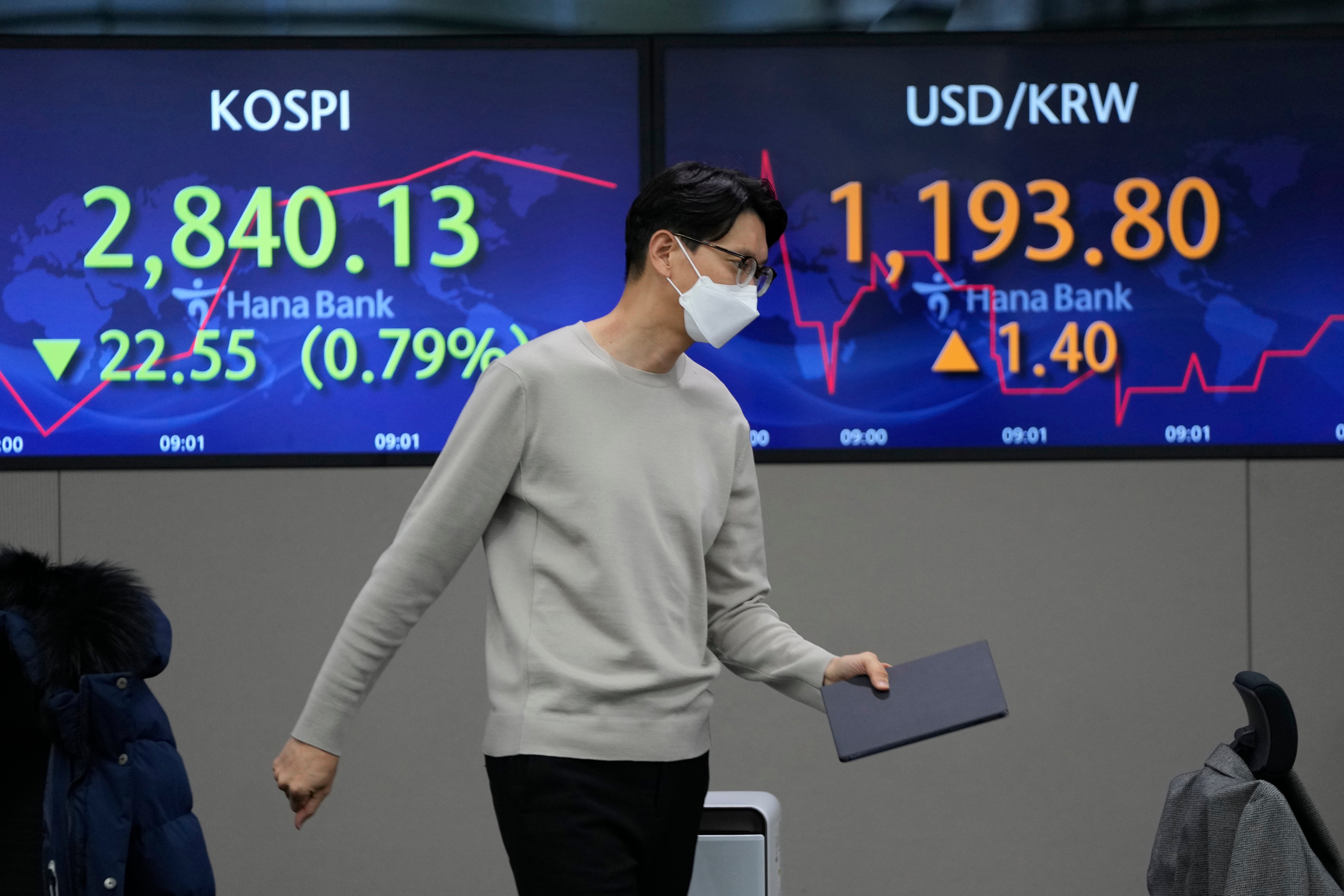Asian shares slide after more losses on Wall Street
Asian shares have declined after a late-afternoon sell-off wiped out gains for stocks on Wall Street

Your support helps us to tell the story
From reproductive rights to climate change to Big Tech, The Independent is on the ground when the story is developing. Whether it's investigating the financials of Elon Musk's pro-Trump PAC or producing our latest documentary, 'The A Word', which shines a light on the American women fighting for reproductive rights, we know how important it is to parse out the facts from the messaging.
At such a critical moment in US history, we need reporters on the ground. Your donation allows us to keep sending journalists to speak to both sides of the story.
The Independent is trusted by Americans across the entire political spectrum. And unlike many other quality news outlets, we choose not to lock Americans out of our reporting and analysis with paywalls. We believe quality journalism should be available to everyone, paid for by those who can afford it.
Your support makes all the difference.Shares were lower in Asia on Friday after a late afternoon sell-off wiped out gains for stocks on Wall Street.
Tokyo fell 0.9% after Toyota Motor Corp. announced production cuts due to parts shortages. Other major regional markets also fell. Oil prices slipped, with the U.S. benchmark crude down as much as 2.3%.
The yield on the 10-year Treasury fell to 1.78% from 1.83% late Thursday.
Investors are bracing for higher interest rates and stocks are headed for weekly losses in what has so far been a losing month.
Surging coronavirus cases have added to jitters over supply chain problems that are disrupting manufacturing.
Toyota, Japan’s top automaker, said it will suspend production at 11 plants in Japan for three days, on top of reductions planned in February. Those cuts mean it will fall short of the 9 million vehicles planned for the fiscal year through March, despite healthy demand. Its shares fell 2.5% on Friday.
Tokyo's Nikkei 225 index lost 537 points to 27,522.26 while the Hang Seng in Hong Kong gave up 0.6% to 24,812.76. The Shanghai Composite index shed 0.8% to 3,526.19.
Hong Kong-traded shares in e-commerce giant Alibaba fell 4.2% after a Chinese-made documentary suggested its financial arm might be implicated in a corruption probe.
The S&P/ASX 200 in Sydney dropped 2.3% to 7,175.80. South Korea's Kospi slid 1.1% to 2,830.82. Thailand's benchmark fell 0.5%.
On Thursday, a late-afternoon sell-off wiped out gains for stocks on Wall Street, sending major indexes deeper into losing territory for the year.
The S&P 500 lost 1.1% to 4,482.73, a three-month low, with nearly 85% of stocks in the index falling. It’s now down 6% for the year.
The Nasdaq composite index fell 1.3% to 14,154.02, after rising as much as 2.1%. By Wednesday, the index’s recent losses had left it in what Wall Street considers a market correction, or 10% below its peak.
More than 500 Nasdaq stocks hit 52-week lows Thursday, including Starbucks and T-Mobile. Apple fell 1% and chipmaker Nvidia shed 3.7%.
The Dow Jones Industrial Average sank 0.9% to 34,715.39.
The sharp about-face for the broader market was once again directed by technology stocks, which have been behind choppy trading throughout the week.
Meta Platforms dropped 1% and Lowe’s lost 4.6%.
The downturn follows a strong 2021, when the S&P 500 gained 26.9%.
The Labor Department provided a disappointing update, reporting that the number of Americans applying for unemployment benefits rose to its highest level in three months as the fast-spreading omicron variant continued to disrupt the job market.
The job market has had a rocky recovery from the virus pandemic though the unemployment rate fell last month to a pandemic low of 3.9%.
Investors are closely watching to see how employment data might affect the Federal Reserve approach to weaning the economy of its support by raising interest rates.
The Fed is now expected to raise rates earlier and more often than it had previously signaled to fight inflation that is threatening the economic recovery. Supply chain problems and higher raw materials costs have prompted businesses to raise prices on finished goods, leading consumers to eventually rein in spending.
The latest round of corporate earnings is also giving investors a clearer picture of where Americans are spending money and how inflation is impacting the economy.
American Airlines fell 3.2% and United Airlines slipped 3.4% after warning investors that the latest surge in COVID-19 cases will hurt their finances early in 2022. Both airlines reported losses for the fourth quarter, though they were smaller than analysts’ expected.
Peloton shares lost nearly 24% after CNBC reported the company is temporarily halting production of its treadmills and exercise bikes after seeing demand for the equipment fall.
The company's shares soared early in the pandemic as people exercised at home, but have dropped 85% since closing at an all-time high of $167.42 on Jan. 13, 2021.
In other trading, U.S. crude oil lost $1.61 to $83.94 per barrel in electronic trading on the New York Mercantile Exchange. It shed 25 cents to $85.80 on Thursday.
Brent crude oil, the basis for pricing international oil, lost $1.43 to $86.93 per barrel.
The U.S. dollar fell to 113.83 Japanese yen from 114.10 yen late Thursday. The euro rose to $1.1327 from $1.1313.